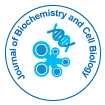Notre groupe organise plus de 3 000 séries de conférences Événements chaque année aux États-Unis, en Europe et en Europe. Asie avec le soutien de 1 000 autres Sociétés scientifiques et publie plus de 700 Open Access Revues qui contiennent plus de 50 000 personnalités éminentes, des scientifiques réputés en tant que membres du comité de rédaction.
Les revues en libre accès gagnent plus de lecteurs et de citations
700 revues et 15 000 000 de lecteurs Chaque revue attire plus de 25 000 lecteurs
Indexé dans
- Publons
- ICMJE
Liens utiles
Revues en libre accès
Partager cette page
Abstrait
Emerging Stem Cell Therapies in Mast Cell Biology
Bashit K
The genesis and development of all higher creatures depend on stem cells, which are the basic building elements of life. The discovery of adult stem cells sparked a therapeutic and regenerative medicine revolution that is still continuing strong and inspired the development of novel treatments for diseases that were once considered incurable. The first instance of a successful stem cell therapy was hematopoietic stem cell transplantation, which is now often used to treat multiple myeloma and adult T-cell leukemia-lymphoma among other illnesses. The autologous transplantation of mesenchymal stem cells is used more frequently to promote the repair of mesenchymal tissue and other tissues, such as the lung and heart, and to treat a variety of illnesses, including diabetes, multiple sclerosis, and stroke. The therapeutic potential of additional adult stem cells, including those from the testicles, breast, intestinal, and inner ear, is now gaining attention. It has become clearer how the underlying epigenetic mechanisms of pluripotency and carcinogenesis work thanks to the discovery of induced pluripotent stem cells. It will be possible to create safer and more precise treatments by doing in-depth research on these epigenetic variations and the physiological changes they cause. It's been known for a long time that mast cells play a crucial and direct role in allergy and inflammatory reactions. These cells influence systemic and local allergic reactions, such as allergic rhinitis and anaphylaxis, in allergic disorders. In addition, several chronic inflammatory disorders are connected to mast cell mediators. Mast cells have a variety of healthy tasks, in addition to their roles in pathological circumstances. These include innate immunity, participation in host defence mechanisms against parasites, immune system immunomodulation, tissue healing, and angiogenesis. Mast cell biology is a field that still needs considerable research despite its growing importance in both physiological and pathological settings. This study provides evidence for the modulation of numerous biological processes in mast cells, including degranulation and endocytosis, by lipid rafts or raft components.
Revues par sujet
- Agriculture et Aquaculture
- Biochimie
- Chimie
- Food & Nutrition
- Génétique et biologie moléculaire
- Géologie et sciences de la Terre
- Immunologie et microbiologie
- Ingénierie
- La science des matériaux
- Le physique
- Science générale
- Sciences cliniques
- Sciences environnementales
- Sciences médicales
- Sciences pharmaceutiques
- Sciences sociales et politiques
- Sciences vétérinaires
- Soins infirmiers et soins de santé
Revues cliniques et médicales
- Allaitement
- Anesthésiologie
- Biologie moléculaire
- Cardiologie
- Chirurgie
- Dentisterie
- Dermatologie
- Diabète et endocrinologie
- Gastro-entérologie
- Immunologie
- La génétique
- Maladies infectieuses
- Médecine
- Microbiologie
- Neurologie
- Oncologie
- Ophtalmologie
- Pédiatrie
- Recherche clinique
- Soins de santé
- Toxicologie

 English
English  Spanish
Spanish  Chinese
Chinese  Russian
Russian  German
German  Japanese
Japanese  Portuguese
Portuguese  Hindi
Hindi